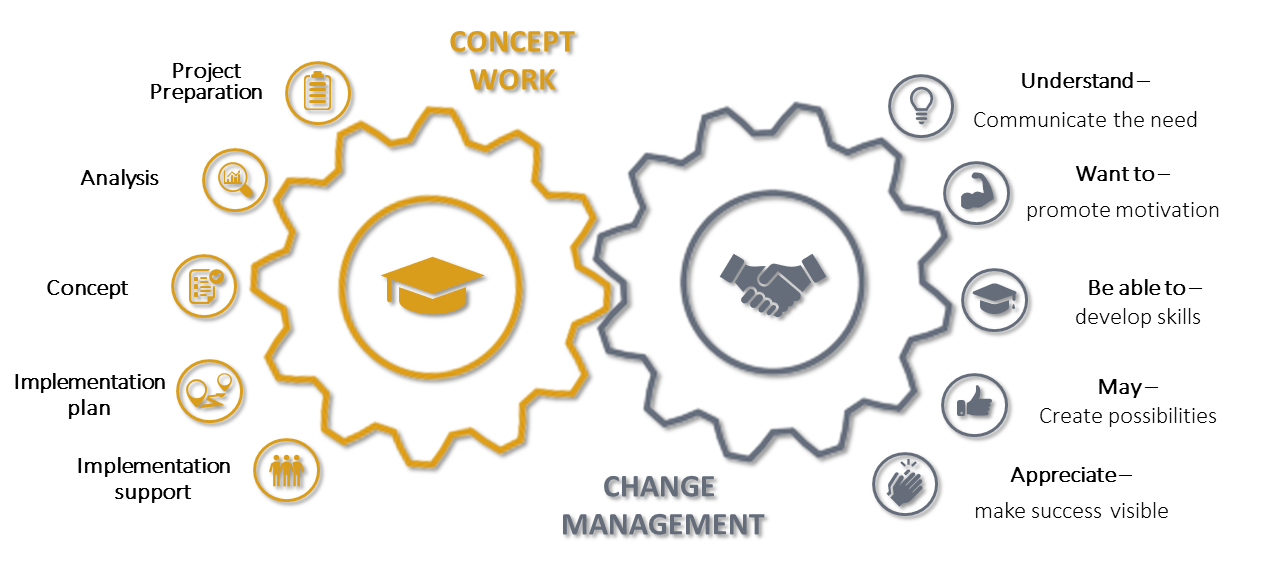Approach
We tailor our approach to fit your company perfectly. It consists of five phases. Each phase includes concept work as well as change management, interacting with each other. This is how we sustainably implement consulting solutions for you.

The five phases of change management
Your consulting project will be a success if the right changes are implemented sustainably. To achieve this, we design an individual approach that matches your company's starting situation and culture, incorporating both concept work and change management. In working towards change, we cycle through 5 phases together:
1) Recognize and convey need for action – You must have a good reason for the change. And you must present and communicate this need for action convincingly. There will be rejection nevertheless: Real willingness to change results only from a great deal of persuasion. We support you in these efforts.
2) Promote motivation to change – For your success, it will be important to know opponents and critics at an early stage. Change will be possible only if your managers and staff actually want change. The solution: actively engage the concerned parties from the beginning and involve them in analysis, concept work and implementation planning. Toward the end of the project, our consultants will increasingly fade into the background and turn the stage over to your change teams.
3) Develop skills – Change can only be implemented if people also have the necessary professional and social skills. By involving the concerned parties early on, you will also be enabling them and turning them into multipliers later on. Training courses, coaching and the support of pilot teams further develop these skills and implement them sustainably.
4) Create opportunities – You need to create the infrastructural and personnel conditions necessary to implement the improvement concepts operationally. The important thing is the behavioral level: If you cannot convice managers of change, they will rarely permit change-promoting behavior of their staff. This is why – again and again – it is essential to gain clear acceptance and commitment of the management; sometimes this also requires coaching.
5) Make impact visible – At the end of the change process, successes must become visible. In the simplest case, this could mean new, improved performance indicators. The decisive factor is to reward change-compliant behavior and keep the level of motivation high.
The five phases of the concept work
We also adapt the approach for our concept work, making it fit your starting situation, objectives and resource situation. Concept work also cycles through 5 phases and is synchronized with the change management:
1) Project preparation – First, we clarify the project objectives, the scope and the deliverables. Before the actual project begins, we define the project organization, create the project planning and implement project steering mechanisms. Then the kickoff takes place, informing all parties involved about both the improvement project and the underlying need for action.
2) Analysis – Depending on the tasks and objectives at hand, an analytical phase of varying scope is carried out. It is typically necessary to have an exact look at the starting situation. Analyses range from short, focused quick checks, to multi-week "Smart Development Assessments" determining the organization’s level of maturity. In this, the interview is one of our most important change management tools. Additionally, we use proven analytical tools such as organizational cost benchmarking, project analyses, task analyses and value stream analyses.
3) Concept – To be more efficient, our consultants prepare draft concepts. The individual concepts are refined in workshops. This integrates all the parties involved at an early stage for the purposes of change management. On the basis of our maturity model and suitable, proven practices, this yields several suggestions for improvement. Together with your managers and staff, we then develop a specific solution tailored to the needs of your company.
4) Implementation planning – Successful change projects require implementation planning after the conceptual phase. We therefore draft an implementation scenario: piloting, gradual implementation or comprehensive roll-out. In addition, we create detailed plans for the individual sub-initiatives. After that, the management can commit to the change – and implementation can begin right away.
5) Implementation support – We are glad to support you during implementation. There are still important conceptual and change management activities, beginning with communication – often at a major introductory event. We support your pilot teams in re-sharpening improvement concepts and in reviewing and optimizing to make them more effective. Next, we address the definition of global standards and a comprehensive implementation. At this point, we will eventually say goodbye – until the next major improvement step in a couple of years!
How we change your company in five phases
- A consulting project is successful only if the right changes are implemented sustainably.
- This will only succeed if managers and employees accept and support these changes.
- A consulting approach tailored to fit your company must therefore include both concept work as well as change management– adapted to your starting situation, objectives and resources.
- The five phases of the concept work are in sync with the change management phases.

